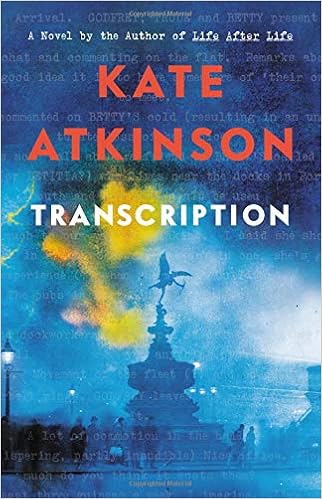Juliet could still remember when Hitler had seemed like a harmless clown. No one was amused now. (‘The clowns are the dangerous ones,’ Perry said.) [loc. 1234]Transcription opens in 1981: Juliet Armstrong, sixty years old, has just been hit by a car on her way home from a Shostakovich concert at the Wigmore Hall. She remembers hearing the Leningrad symphony at the Proms in 1942: and that seems to open the floodgates, for almost at once we are back in 1950, when Juliet works for the BBC (a producer in Schools), and receives a warning: 'you will pay for what you did'. And thence back to 1940, when Juliet works for MI5 transcribing the treasonous utterings of Nazi sympathisers in the flat next door.
Wartime Juliet is a capable spy, going undercover as a vacuous socialite, assuming and discarding other identities with ease and aplomb. Her colleagues, both male and female, are equally mutable. Despite her competence, though, Juliet is possessed of a certain naivete: she fails to spot that her boss, Perry, is gay; and more importantly, is oblivious to the double-agent dealings happening around her. (To be fair, the spy genre was in its infancy at this point: the tropes we regard as cliched -- for instance a newspaper left by one man and swiftly collected by another -- were probably cutting-edge tradecraft in 1940. On the other hand ... "It was rather exciting, as if she were in a Buchan novel or something by Erskine Childers.")
Post-war Juliet is rather less in her element. She is unmarried; she encounters people from her past, but they pretend not to know her; she's haunted by something terrible that happened when she worked for MI5; she is brittle, aimless, and bored.
I would probably have enjoyed this novel more if I'd liked Juliet, but I think that's part of the point: to be drawn into her life, to see things as she does, to share her fears and her exasperation -- Juliet is frequently exasperated, by sexism, by stupidity, by the inconveniences of post-war life. Perhaps she does feel superior to those around her. Perhaps she's right.
When I finished the novel I noted that I felt the climactic revelations (or some of them) had come out of nowhere: that the ending felt rushed. On reflection, I think those revelations were signalled throughout -- indeed, from the brief 1981 introduction, the accident after the Shostakovich concert. A masterful construction, with (as is usual in Atkinson's novels) recurring themes and motifs -- small dogs, dead mothers ...
Incidentally, this novel contains a line which I found depressing: Juliet is musing on why she doesn't play the piano any more, though she does own a gramophone.
Listening, not playing – in the same way that reading was the opposite of writing. [loc 2761]
I think I disagree. Or perhaps I think that consuming and producing are two sides of the same activity.

No comments:
Post a Comment